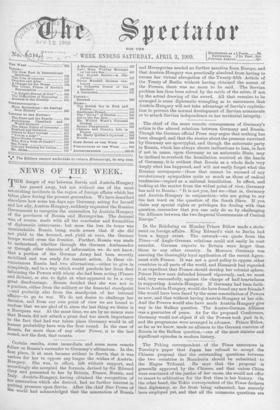In the Reichstag on Monday Prince Billow made a state-
ment on foreign affairs. King Edward's visit to Berlin had been a happy event. The network—we quote from the Times—of Anglo-German relations could, not easily be rent asunder. German exports to Britain were larger than those to any other country. In Morocco• Germany was assuring the thoroughly loyal application of the recent Agree- ment with France. It was not a good policy to oppose other countries in all parts of the world, and Bismarck had regarded it as expedient that Franca should develop her colonial sphere. Prince Billow next defended himself vigorously, and, we must add, very successfully, against the charge of half-heartednesa in supporting Austria-Hungary. If Germany had been faith- less to Austria-Hungary, would she have found any new friends I' She would have been faced by the same constellation of Powers as now, and that without having Austria-Hungary at her side. And the Powers would also have made Austria-Hungary give way in the Balkan question. The Austro-German Alliance was a guarantee of peace. As for the proposed Conference, Germany would not object if all the Powers took part in it, and the programme were arranged in advance. Prince Billow, so far as we know, made no allusion to the German coercion of Russia in the Balkan question,—one of the most sinister and. significant episodes in modern history.










































